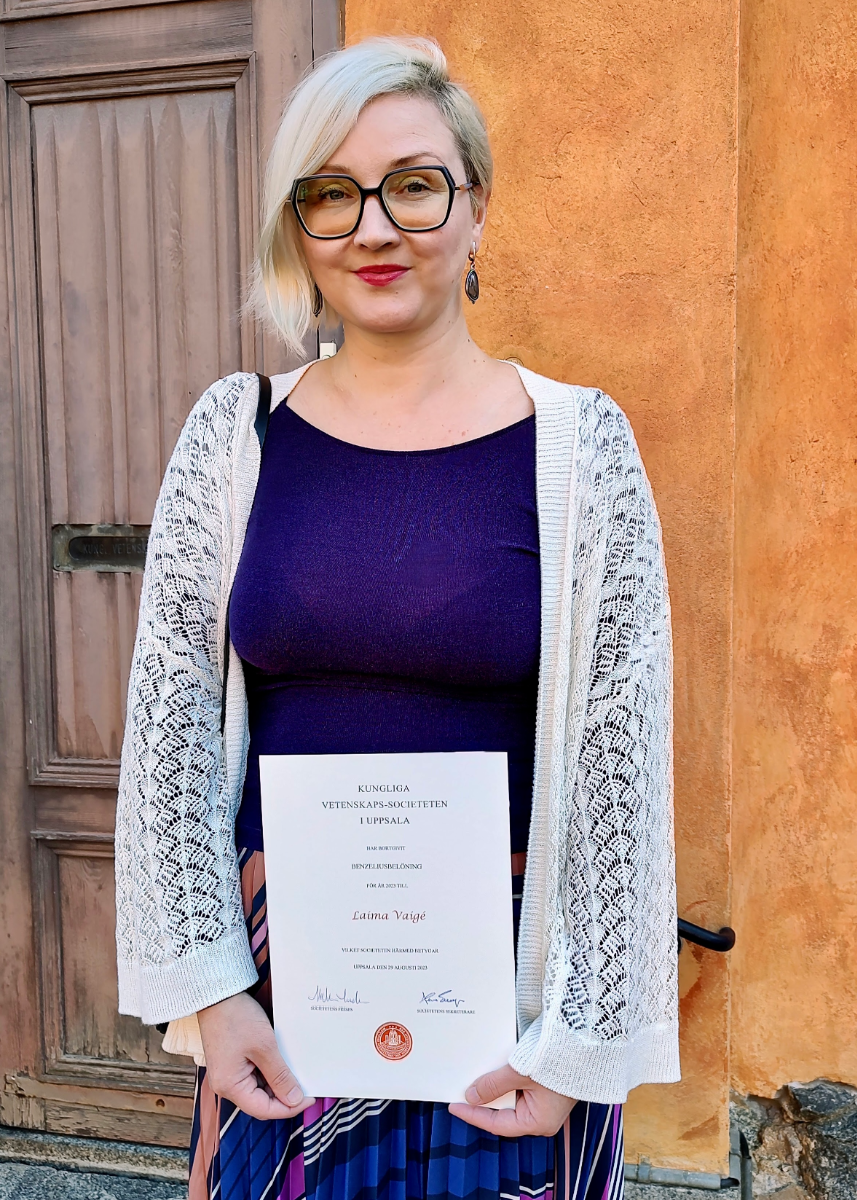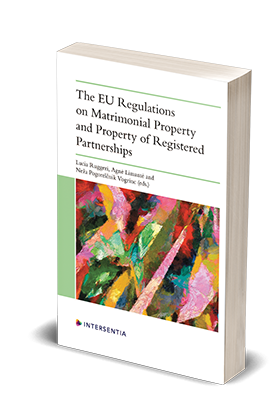| Interview |


An interview with Laima Vaige, author of Cross-Border Recognition of Formalized Same-Sex Relationships: The Role of Ordre Public, and winner of the Royal Society of Sciences’ Benzelius Prize for her research in human rights and private international law
Laima Vaige speaks to us about her book, Cross-Border Recognition of Formalized Same-Sex Relationships: The Role of Ordre Public, published in 2022 by Intersentia. In this exclusive interview, Vaige discusses the concept of supranational ordre public, its potential role in enforcing marriage equality, and the importance of interdisciplinary research.
What is ordre public?
In the area of private international law, legal systems and rulings are potentially open to recognition of family statuses that could not be created within the State of origin, for various reasons, but are instead established externally. We recognise marriages that cannot be concluded in our States, because they had been lawfully concluded under the applicable law in a different jurisdiction. In this way, private international law is open to the influence of foreign or external social and legal norms. That is justifiable, because this is the special field of law that applies, provided that the so-called foreign element is present.
The ordre public safeguard in private international law means that the State’s public policy is used to refuse application of foreign law or recognition of a court decision from abroad, or a status concluded abroad, such as marriage or registered partnership. It works as a safety valve, filtering out those elements considered completely unacceptable in the State of recognition. A State might recognise a same-sex marriage or even a polygamous marriage, but not a forced marriage, for instance, despite its potential validity in the State of conclusion.
Ordre public is described as “the concept of the day”, and that means that its content changes with time—sometimes within a very short period. In the literature, we can find words or phrases such as “gut reactions” to certain foreign law or statuses, or even a feeling of potentially infringed “dignity” from the respective State. This cannot be solely explained by law. The political environment, societal norms and national subjectivity seem to play a huge role. The less such a socio-political context is understood in a certain legal culture, the greater role it potentially plays.
How does ordre public relate to the European conception of human rights?
Besides the national understandings of the ordre public, my book analyses to what extent the supranational European ordre public could limit the possibilities to refuse cross-border recognition of same-sex marriages and registered partnerships in the future. The European ordre public in this area means that there are certain legal standards under EU law and the European Convention on Human Rights that the respective EU States cannot disregard simply because there is a “gut feeling” of dislike towards same-sex relationships. In private international law, the ordre public safeguard bears a specific meaning that is restricted only to international or external aspects of the State’s public policy. That means the use of ordre public to refuse recognition of a formalised civil status must be justifiable under the European Convention and EU primary law.
How do traditional family values prevent gender equality, and how does European law move past this?
In some of the legal systems I analysed—for instance, in Latvia, Lithuania and Poland—the political resistance to the establishment and enforcement of LGBTQ rights has been tied to traditional family values and the construction of the national identity. In contrast, in Estonia, the concept of the enforcement of universal human rights appears to be more aligned with the national identity, and the political instrumentalisation of religion is also less pronounced. This partially explains why Estonia introduced the institute of registered partnership and recently opened up the institute of marriage to same-sex couples. However, there are a complex set of historical circumstances and differences in respective legal cultures that result in varied interpretations of such terms as “tradition” and “family”. I must note that gender equality is also a value of merit in these States, but the historical survival of the nation is, implicitly or explicitly, tied to the notion of the traditional heterosexual family.
To me, gender equality means that men and women are of equal worth and are functionally replaceable at work or in the family. When marriages are only recognised with the condition that spouses are of different sex, that means that the effect of law is gendered. The European supranational courts never stated that formalised same-sex relationships should be recognised for all purposes of private international law. Thus, European law did not quite move past this obstacle, and the gendering effect is still present.
Nevertheless, the European supranational courts do expect that formalised same-sex relationships will be recognised in one form or another. In all cases analysed so far, it has been ruled that national identity and ordre public should not be seen as justifying the denial of legal recognition of formalised same-sex relationships. However, there is a tendency for only minimal recognition to be granted, “solely for the purposes” for fulfilling the part of the right that is urgently relevant and on the condition that the right had been infringed by non-recognition. Metaphorically speaking, instead of granting the entire “pie” of rights related to the pre-existing institution of marriage, the European supranational courts focus on giving out one piece at a time—sometimes, only handing out a crumb. This approach does not make sense in private international law, where the presumption of marriage validity applies and non-recognition can only be an exception rather than the norm.
What are you most proud of when it comes to this volume?
It is never an easy task to conduct interdisciplinary research. I needed to not only research different systems of law, but also conduct exploration in the areas of political science, social psychology, religious studies, history and philosophy, to be able to understand the normative contexts of these respective legal systems. Although it is hard to pull off, interdisciplinary research is fulfilling for me, and I am proud to promote it further. I think different disciplines and areas of study need to interact, interchange ideas and bubble with life, rather than be closed off in separate towers of knowledge.
I am also happy at the prospect that this legal research can give hope to same-sex couples who should be afforded more legal certainty in the future. Everyone deserves to know whether they are still legally married and whether their children are still their legal children once they cross State borders in Europe.
About the book


The EU Regulations on Matrimonial Property and Property of Registered Partnerships
This volume contributes to the literature on private international family law in Europe through the examination of two recent EU instruments: the Matrimonial Property Regulation and the Regulation on the Property Consequences of Registered Partnerships. The book presents the two regulations in a clear and comprehensive manner and analyses their implications for EU family law going forward.
Lucia Ruggeri, Agne Limante, Neža Pogorelcnik Vogrinc
February 2022
ISBN 97817839701993